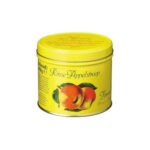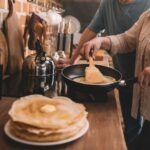House plants
The Dutch are very fond of houseplants, the more the merrier! You will find the typical Dutch home filled with a large amount of house plants in all shapes, sizes and colours. Walking the average street, you will spot window sills with many houseplants on display. Placing two identical house plants next to each other on a window sill is considered stylish. You will find house plants and everything you need to care for them at a wide range of places, whether the garden centre or the supermarket. In addition, a Dutch home would be empty without fresh flowers on display. Most florists will provide you with a free mini package of flower food when purchasing a bouquet. For international flower delivery, most Dutch florists are able to arrange this for you via their Interflora network.
Bike pump
 The Netherlands is a bike-friendly country and you will have to pump those tyres every now and then to cycle comfortably. You will find bike pumps to use at home as well as mini versions to clip onto your bike at bike stores and department stores. As the pull out part of a bike pump can easily get rusty in the Dutch rain, it is best to store it inside. Pumping your tyres also makes for an excellent work out, for your arm muscles especially.
The Netherlands is a bike-friendly country and you will have to pump those tyres every now and then to cycle comfortably. You will find bike pumps to use at home as well as mini versions to clip onto your bike at bike stores and department stores. As the pull out part of a bike pump can easily get rusty in the Dutch rain, it is best to store it inside. Pumping your tyres also makes for an excellent work out, for your arm muscles especially.
Flag & flagpole holder
 Whereas in other countries it may be completely okay to display a national flag all year round, The Netherlands has strict protocol for using the national banner. Fines are in places for violating protocol. Traditional Dutch homes will have a flag pole holder attached to the front of the home, right next to the front door, whereas you may also see flag pole holders in the gardens of larger detached homes. The national banner is normally on display on King’s Day (April 27) as well as on the birthdays of members of the Royal Family. The Dutch flag is traditionally raised to half-mast on May 4th for the national commemoration of the Second World War. On national festive occasions such as King’s Day the orange wimpel, an additional orange banner, is on display together with the Dutch flag. The orange wimpel symbolizes the House of Orange, as the Dutch Royal family is also named.
Whereas in other countries it may be completely okay to display a national flag all year round, The Netherlands has strict protocol for using the national banner. Fines are in places for violating protocol. Traditional Dutch homes will have a flag pole holder attached to the front of the home, right next to the front door, whereas you may also see flag pole holders in the gardens of larger detached homes. The national banner is normally on display on King’s Day (April 27) as well as on the birthdays of members of the Royal Family. The Dutch flag is traditionally raised to half-mast on May 4th for the national commemoration of the Second World War. On national festive occasions such as King’s Day the orange wimpel, an additional orange banner, is on display together with the Dutch flag. The orange wimpel symbolizes the House of Orange, as the Dutch Royal family is also named.
Another typical Dutch custom is to raise the flag once a child has graduated from high school. The proud parents will display their child’s school bag combined with the national flag for all the street to see. It makes for a very festive sight in the months leading up to the Summer school holidays.
If you have something special to celebrate and would like to raise your flag, check with your local council to see whether you would be allowed to do so and whether they may be willing to make an exception. If your home does not have a flagpole holder, you will find one at hardware stores like Gamma and Praxis.
Gourmetstel
Gourmetting is the custom of sharing a meal using a square, electrical portable stove with tiny pans on top. Your host will fill the table with bowls containing all sorts of ingredients ranging from veggies to fish and meat to pancake batter. Each person can fill their tiny pan with whatever they crave as many times as they like. It is a wonderful, low-key way to experiment mixing all sorts of ingredients. Gourmetting is a popular Dutch custom when hosting a larger group of people for dinner in a relaxed, informal manner. You will find a gourmetstel at home supplies stores such as Blokker or on secondhand websites. The traditional gourmetstel features eight tiny pans but these days you will also find them in a six pan and four pan format.
Appelstroop
 Where other countries may proudly market their maple syrup, marmite or treacle, The Netherlands has something else for you to try. Traditional Dutch appelstroop is a healthy, gelly, thick apple butter which would traditionally be eaten on bread or toast but can also be added to yoghurt or other foods. Packed with vitamin C and iron, it is a tasty and healthy traditional Dutch food item.
Where other countries may proudly market their maple syrup, marmite or treacle, The Netherlands has something else for you to try. Traditional Dutch appelstroop is a healthy, gelly, thick apple butter which would traditionally be eaten on bread or toast but can also be added to yoghurt or other foods. Packed with vitamin C and iron, it is a tasty and healthy traditional Dutch food item.
Poffertjespan/pancake pan
 There is nothing quite like a plate of hot poffertjes topped with powdered sugar and a tiny bit of butter. The traditional Dutch poffertjespan is made of cast iron and will last a lifetime. Rinse it with water and let it airdry. Avoid washing up liquid.
There is nothing quite like a plate of hot poffertjes topped with powdered sugar and a tiny bit of butter. The traditional Dutch poffertjespan is made of cast iron and will last a lifetime. Rinse it with water and let it airdry. Avoid washing up liquid.
The bag of St. Nicholas
 Another item you will find in every Dutch home that will re-appear annually is the bag of St. Nicholas, more commonly known as Sinterklaas. This is a spacious burlap bag with a December 5 print on it. People will start filling it with gifts in the weeks leading up to December 5th before hiding it somewhere in the home. On December 5th, one of the parents would sneak out of the house to knock on the front door to then quickly run away leaving the bag on the door step. The children will then be told that St. Nicholas just stopped by and joy will spread as the bag is brought into the living room where all will gather around the bag unwrapping its precious contents one by one. The bag of St. Nicholas will often last a lifetime and is sometimes passed down generations.
Another item you will find in every Dutch home that will re-appear annually is the bag of St. Nicholas, more commonly known as Sinterklaas. This is a spacious burlap bag with a December 5 print on it. People will start filling it with gifts in the weeks leading up to December 5th before hiding it somewhere in the home. On December 5th, one of the parents would sneak out of the house to knock on the front door to then quickly run away leaving the bag on the door step. The children will then be told that St. Nicholas just stopped by and joy will spread as the bag is brought into the living room where all will gather around the bag unwrapping its precious contents one by one. The bag of St. Nicholas will often last a lifetime and is sometimes passed down generations.
Mosquito windows
The typical Dutch home is equipped with mosquito windows (called ‘hor’ in Dutch) for the Summer months. Mosquito windows are made of a special type of netting placed in a steel frame to fit the size of a particular window and is attached by clips constructed onto the wooden window frame of your home. You can make such a hor yourself or have them made-to-measure for you at a local glazier or specialized home decor store.
BBQ
 BBQ-ing is very popular in The Netherlands and very much part of the smell of Summer. The Dutch enjoy bbq-ing in their gardens or on their roof terrace or balcony and it is always a popular way to feed people at community events or even weddings. BBQ-ing may or may not be allowed on certain beaches and recreational sites, do check the signs when you get there. You will find BBQ’s in all shapes, sizes, colours and price ranges, from very cheap single use ones up to very fancy ones at garden centres and a wide range of other stores. If you rent or own an apartment, check your Vereniging van Eigenaren (Home Owners Association) house rules to find out whether you are allowed to BBQ in your garden, on your balcony or in communal areas.
BBQ-ing is very popular in The Netherlands and very much part of the smell of Summer. The Dutch enjoy bbq-ing in their gardens or on their roof terrace or balcony and it is always a popular way to feed people at community events or even weddings. BBQ-ing may or may not be allowed on certain beaches and recreational sites, do check the signs when you get there. You will find BBQ’s in all shapes, sizes, colours and price ranges, from very cheap single use ones up to very fancy ones at garden centres and a wide range of other stores. If you rent or own an apartment, check your Vereniging van Eigenaren (Home Owners Association) house rules to find out whether you are allowed to BBQ in your garden, on your balcony or in communal areas.
Tiny toilets
Traditional Dutch homes will often feature a tiny toilet on the first floor, often close to the main entrance. Back in the day, toilet spaces were built for practicality and not for comfort. For the same reason, ensuite bedrooms are not common in Dutch homes as entire families would share just one shower room. Toilet spaces in older Dutch homes are often so tiny that you will hardly be able to turn around or have space to change your clothes, freshen up or do your makeup when visiting someone’s home. If you are attending a party of event and would like to change from your office clothes into something more suitable, style your hair and do your makeup, ask if you might be able use the shower room instead. Aside from these toilet spaces being tiny, it is also common for them to not have any heating installed. If you would like to rent of buy a house with a spacious and comfortable, heated toilet area, or multiple toilets, find a more recently newbuilt.

Understanding Mortgage Calculators ...
Buying a home in the Netherlands involves careful financial planning, especially for expats navigating the ...

Mortgage Interest Rates in 2025: Wh ...
As 2025 unfolds, expats navigating the Dutch housing market find themselves in a shifting financial ...

Remodeling your house in the Nether ...
Have you just bought or rented a house that needs remodeling – but have no idea ...

How to safely use public wifi netwo ...
Public Wi-Fi networks come with a significant risk to the security of your personal ...

Be prepared for the Dutch housing m ...
Buying a house in the Netherlands may work a bit differently to what you are ...

The UnDutchables 9.0
Following the legendary previous eight editions of The UnDutchables, the 9th edition of this all ...

This is your checklist for moving t ...
Do you plan to move to Amsterdam or somewhere else in our beautiful country to ...

Making the most of your Dutch home
Whether you are renting, staying in a long-term AirBNB or have just bought a ...

Gift giving in the Netherlands-all ...
If you feel like skipping your birthday, you may be in for a challenge when ...

10 things you will find in every Du ...
The Dutch are very fond of houseplants, the more the merrier! You will find the ...